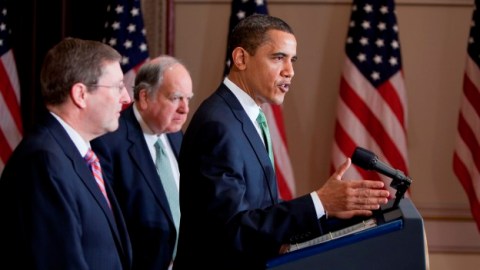Tax Cut Fantasies

Talking Points Memo flags a headline today that captures some of what’s wrong with American politics. The headline, from George Stephanopoulos’ blog on ABC, reads, “Sen. Conrad: Extend All Tax Cuts; Time to Get ‘Serious’ About Deficit.”
Stephanopoulos reports—without comment—that Sen. Kent Conrad (D-ND), who is the Chair of the Senate Budget Committee and serves on the Deficit Reduction Commission, favors extending all the Bush tax cuts as part of his plan to reduce the deficit. On this score, Conrad echoes the Republican “Pledge for America.” One problem: cutting taxes makes the deficit go up.
In theory, of course, there is a point at which lowering the tax rate actually should increase tax revenues, by encouraging people to work and earn more. But there is little reason to believe we are at that point. In fact, as Ruth Marcus points out, tax revenue fell from 21% of GDP in 2000, the year before the Bush tax cuts were enacted, to 17.5% of GDP in 2008. Tax revenues were substantially lower as a percentage of GDP throughout the 2000s than they were in the 1990s. That wasn’t entirely the result of the Bush tax cuts, which didn’t cause the dot-com bubble burst or the recession that followed. But it’s hard to believe the tax cuts did that much to stimulate growth—they certainly didn’t prevent the economy from having its worst decade since the Great Depression. Brian Riedl at the Heritage Foundation argues that entitlement programs and not tax cuts are the main source of the deficit, but he still calculates that the Bush tax cuts cost us $1.7 trillion and will account for 14% in the increase of the deficit between 2002 and 2011. And the non-partisan Congressional Research Service estimates that extending the Bush tax cuts would lower tax revenues $1.1 trillion over the next 5 years.
So far from helping eliminate the deficit, extending the Bush tax cuts would make it much worse. The idea that tax cuts will reduce the deficit—shared by politicians on both sides of the aisle—is pure have-your-cake-and-eat-it-too fantasy. The same can be said of the idea that we can reduce the deficit by cutting non-defense discretionary spending or reducing earmarks. Even eliminating non-defense discretionary spending entirely—essentially shutting the entire government except for the Defense Department down—wouldn’t be enough to balance next years budget as it is. In fact, we’d need to cut non-defense discretionary spending 25% just to make up for extending the Bush tax cuts.
Politicians get elected by selling the idea that we can avoid hard choices, and that we can get government for free. The hard truth they want to avoid is that if we want to have the best military in the world and keep entitlements programs like Medicare, we’re going to have to pay for them.





